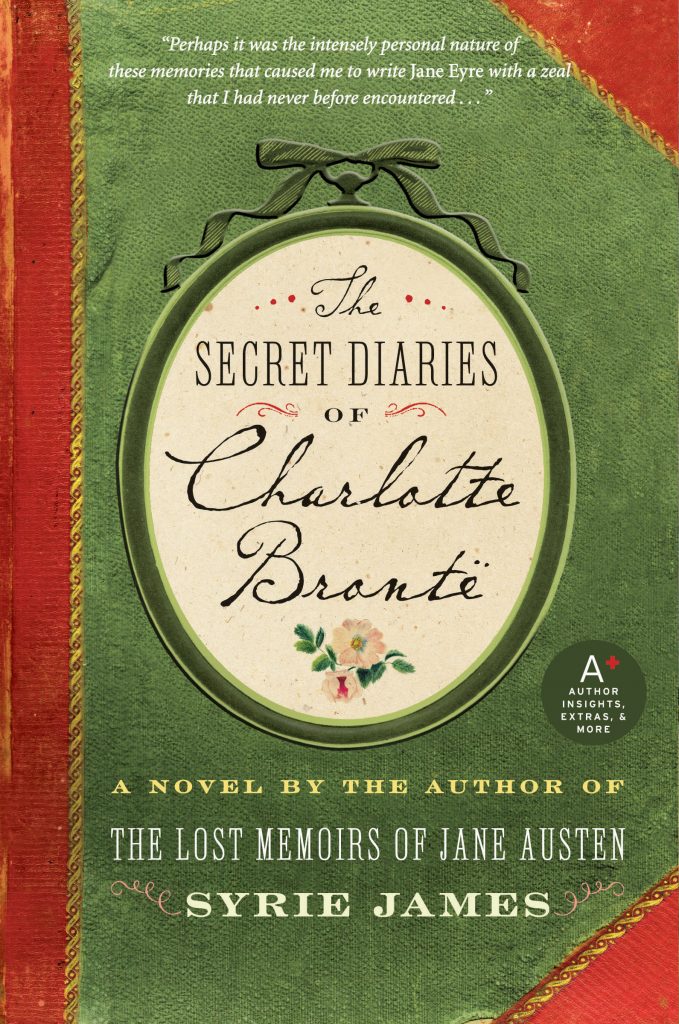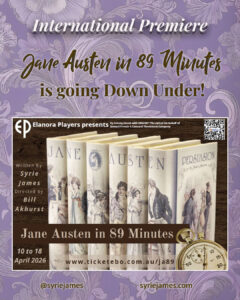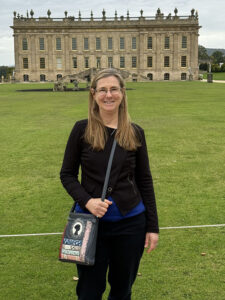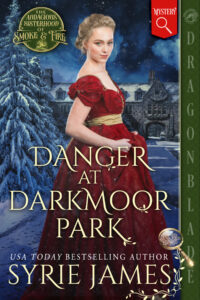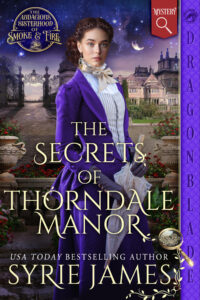EMILY film review — an impassioned biopic of Wuthering Heights author Emily Brontë
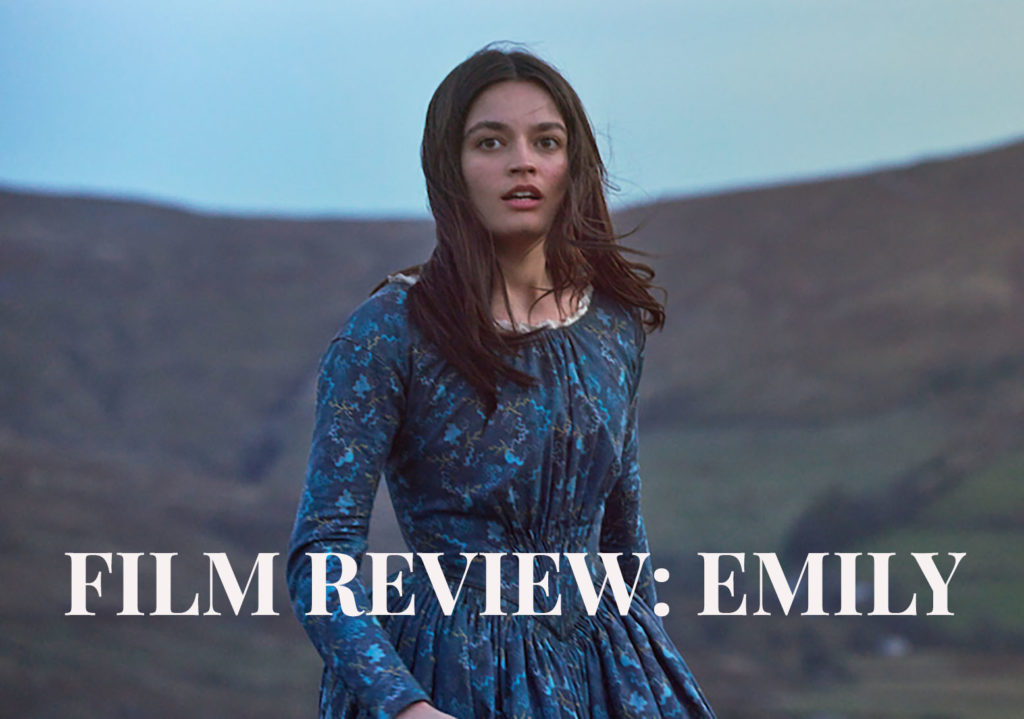
In the film EMILY, Emma Mackey brings Emily Brontë to vivid life in writer/director Frances O’Connor’s thrilling blend of fact and fiction.
Emily Brontë is something of a mystery. When she tragically died at age 30 of tuberculosis, she left behind few preserved letters, and no diary to reveal her private thoughts and feelings. Her sister Charlotte, to whom Emily was “dear to me as life,” described Emily as an unsophisticated loner. “My sister’s disposition was not naturally gregarious,” Charlotte wrote. “Except to go to church or take a walk on the hills, she rarely crossed the threshold of home.” And yet, within this “unsophisticated” young woman, Charlotte exclaimed, “lay a secret power and fire that might have informed the brain and kindled the veins of a hero.”
That secret power gave us Wuthering Heights (1847), a tale of cruelty, revenge, and obsession, which many consider to be one of the greatest novels ever written in the English language. It’s less well known that Emily Brontë also wrote some 200 stunningly beautiful poems, which range from rapturous and uplifting to fierce and bleakly despairing.
Many of Emily’s most famous poems, such as No Coward Soul is Mine and Remembrance, are magnificent yet sad laments about death or lost love. My personal favorite is A Little While, A Little While, in which Emily rejoices in a short respite from the daily grind of work to revel in the beauty of the moors and her love for hearth and home. Here’s one lovely stanza, which proves Emily wasn’t all gloom and doom:
The mute bird sitting on the stone,
The dank moss dripping from the wall,
The thorn-trees gaunt, the walks o’er grown,
I love them, how I love them all!
I enjoyed Frances O’Connor as a revisionist Fanny Price in the 1999 adaptation of Jane Austen’s Mansfield Park. In EMILY, O’Connor’s directing debut, she plays similarly loose and free with the source material, taking what little we know of Emily Brontë’s life and disposition and conjecturing what might have inspired her to write such breathtaking and original works.
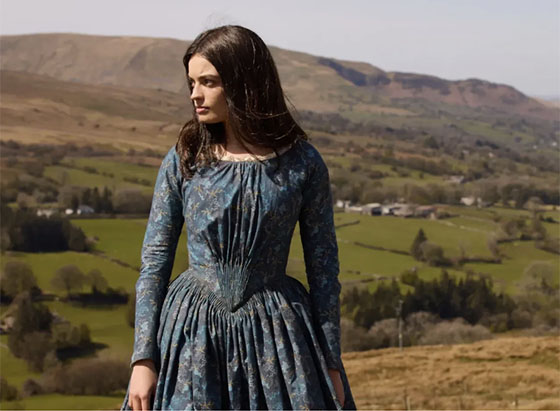
Image by Michael Wharley/Popara Films Ltd., courtesy of Warner Bros. & Bleecker Street
The villagers in Haworth called Emily “the strange one,” and this film shows us why. The mega-talented Emma Mackey, who won the EE Rising Star Award at this year’s Film BAFTAs for her turn in the biopic, plays Emily as a woman of many conflicting temperaments: anxious, exuberant, withdrawn, vehement, awkward, stubborn, unable to deal with strangers or look anyone in the eye, and passionate.
The movie was filmed in real-life Brontë haunts in Yorkshire including Bradford, Haworth, the Brontë Parsonage, and the expansive moors where Emily loved to wander. I spent many memorable days touring these same locations while researching my novel The Secret Diaries of Charlotte Brontë, and it was fun to recognize the very rooms the Brontës inhabited and the furniture they used—such as the black horsehair-stuffed sofa upon which Emily is said to have expired. The costumes are picture perfect and period appropriate. Unlike other recent historical dramas such as Bridgerton, which eschew headwear, we get bonnets!

Image by Michael Wharley/Popara Films Ltd., courtesy of Warner Bros. & Bleecker Street
The camera work by cinematographer Nanu Sega sets a terrific mood, alternating between light and dark, sunshine and pouring rain, at times dashing across a field as if flying, at other times going quiet and still, highlighting the excitement and urgency of a moment.
Don’t expect historical accuracy in this story—and in some instances, such as Emily’s romance, why should we? In my Brontë novel, I based Charlotte’s real-life stormy relationship with the curate Arthur Bell Nicholls on all that we know, and I was obliged to blissfully conjure the rest. In my bestselling novel The Lost Memoirs of Jane Austen, Jane Austen has a passionate romance with a man I believe she would have loved, and who very well might have inspired her return to writing.
Similarly, in O’Connor’s desire to understand how an unmarried recluse could have given us the fiery Catherine Earnshaw and Heathcliff, she imagines a passionate love story for Emily with the curate William Weightman (Oliver Jackson-Cohen in an excellent portrayal). Weightman, who really did work as Patrick Brontë’s (Adrian Dunbar) curate for a few years, is handsome, serious, and deeply thoughtful. His first sermon—so different from Mr. Brontë’s fire-and-brimstone—is a gentle rhapsody about rain. All three Brontë sisters can’t help but be captivated. And he sends them Valentines! (That really happened.)
When Charlotte and Anne are away from home, Weightman tutors Emily in French. She is initially antagonistic, but their relationship heats up and leads to steamy encounters involving actual bodice-ripping. Yes: be forewarned. This is a sexy movie. It’s not the way I envision Emily, but who’s to say it didn’t happen?
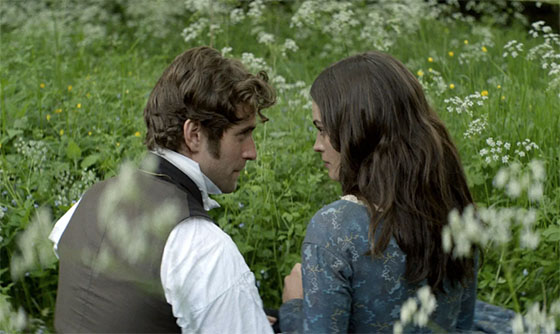
Oliver Jackson-Cohen as William Weightman, alongside Emma Mackey as Emily Brontë. Photograph: Michael Wharley
My favorite scene comes earlier, when Emily, her brother, sisters, and newcomer Weightman play a parlor game. Emily dons a mask and summons the spirit of their long-departed mother in such a frightening and realistic portrayal that the entire company is spooked. It is a canny speculation on what might have inspired the moment in Wuthering Heights when a ghost rattles the window frame on a similarly dark and stormy night.
Emily’s brother Branwell (well-played by Fionn Whitehead) is a dissipated alcoholic and opium addict who never quite found himself. Her sister Anne (Amelia Gething) is Emily’s initial partner in creativity—they still “talk out” stories set in their own imaginary world, as they’ve done since childhood. Unfortunately, Charlotte (Alexandra Dowling) is unfairly presented as controlling, critical, and insensitive—this dour Charlotte could never have written the masterpiece Jane Eyre. Worse, she’s portrayed as envious of Emily’s talent, which I don’t believe for a minute. Charlotte admitted that in her lesser-known novel Shirley, she based the titular character on Emily—a young woman she clearly adored and admired.

I have a few other issues with the film. Emily steals her brother’s opium and tries it. Really? That was hard to watch. We almost never see Emily writing. We don’t get to hear her poetry—we only hear about it. It would have been exciting to be treated to Emily’s fiery words at the moment of their creation. Emily seems to write Wuthering Heights in seconds. It’s immediately published in a lovely volume under her real name, becomes an instant hit and, after her death, it’s suggested that this is what inspires Charlotte to write.
In fact, all three sisters were devoted to writing their entire lives and worked alongside each other for years, sharing ideas and discussing their works in progress. Emily and Anne had to pay from their own pockets to have Wuthering Heights and Anne’s Agnes Grey appear in print. The disreputable publisher brought out the three-volume set in cheap pasteboard covers, and it was largely dismissed by disapproving Victorian critics and readers. (It wasn’t until many years later that Wuthering Heights found its audience and fame.)
Charlotte was luckier with Jane Eyre, which was handsomely published two months earlier by Smith, Elder and Company. Jane Eyre did become a sensation, but Charlotte—sorry for her sisters whose novels weren’t well-received—found it difficult to enjoy her success. Moreover, based on the prejudice against female writers at the time, all three published under pseudonyms with non-binary first names—Charlotte as Currer Bell, Emily as Ellis Bell, and Anne as Acton Bell. In EMILY, I wanted to see the Brontë sisters’ struggle to be published, and their reasons for using pseudonyms. It would have added to the drama and poignancy.
Did Emily Brontë really have an affair with William Weightman? It’s a compelling notion to speculate, but far more than that, whatever is true or imagined here, it’s a thrill to see this wild, windswept tale about the brilliant Emily Brontë brought to life on the screen.
Images by Michael Wharley/Popara Films Ltd., courtesy of Warner Bros. & Bleecker Street.
Learn more about the Brontës in my novel The Secret Diaries of Charlotte Brontë, which explores Charlotte’s relationships with Emily and Anne and their brother Branwell, the sisters’ journey to becoming published authors, Charlotte’s secret passion for her married professor, Monsieur Heger, and her stormy romance with Arthur Bell Nicholls, the Irishman who was in love with her for years before he had the nerve to propose. Winner, Audiobook Audie Award. Women’s National Book Association Great Group Read.
“Syrie James takes the biography of Brontë and sketches it into a work of art. A can’t-miss novel for Brontë fans and historical fiction buffs alike.”
—Sacramento Book Review
“Syrie’s story of Charlotte offers it all: longing and yearning, struggle and success, the searing pain of immeasurable loss, and the happiness of a love that came unbidden and unsought. I did not want this story to end.”
—Jane Austen’s World
“Readers will be glued to its pages from start to finish. Syrie James’s extensive research shows all throughout the book. The style in which the novel is written imitates Charlotte Brontë’s.” —Brontë Blog
Find The Secret Diaries of Charlotte Brontë here.
Related
Jane Austen in 89 Minutes is Going Down Under!
🎉 I’m thrilled to share that my comedy, Jane Austen in 89 Minutes, is going Down Under! The international premiere is April 10 – 18, 2026, at the Elanora…
My Epic Jane Austen, Charlotte Brontë, and All Things English Holiday
It’s the 250th anniversary of the year of Jane Austen’s birth, and I just had to spend a month in England this autumn to pay homage to the brilliant writer…
My new Victorian Murder Mystery & Gothic Romance, Danger at Darkmoor Park
I’m excited to share that DANGER AT DARKMOOR PARK, my new Victorian historical murder mystery and Gothic romance, comes out October 28. I hope it will keep you turning…
Don’t Miss The Secrets of Thorndale Manor, a Twisty Victorian Mystery
I’m thrilled to announce that my new Victorian historical mystery novel, THE SECRETS OF THORNDALE MANOR, releases on June 28. Isn’t the cover gorgeous? This is book 2 in…
